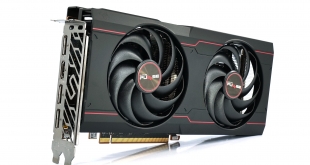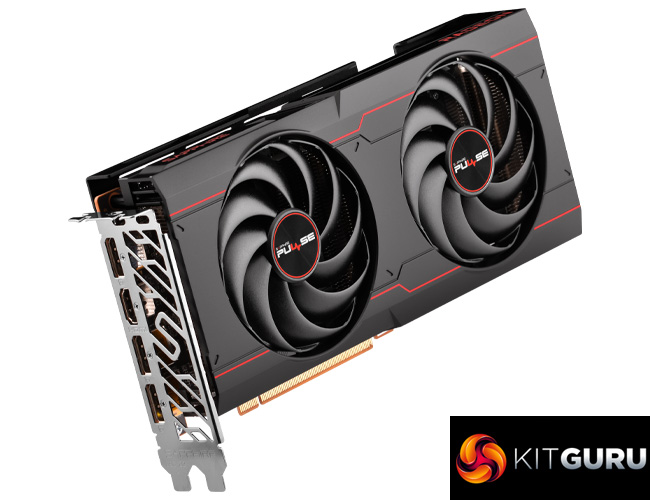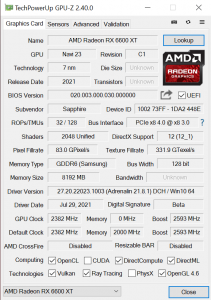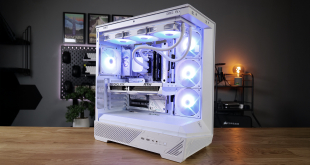
Following on from our first RX 6600 XT review yesterday, today we are back with a look at the Sapphire RX 6600 XT Pulse. Having reviewed plenty of Sapphire's Nitro+ cards this generation, this is our first look at a Pulse model since the launch of the RX 5600 XT. With just a $20 price premium over AMD's baseline MSRP, what does the Pulse have to offer potential customers?
The Sapphire Pulse series has garnered a lot of praise over the years, with the cards designed to offer a ‘no frills' experience, for those who just want solid build quality, strong cooling performance and a capable VRM. If you like a few extra features, such as on-board ARGB headers, dual-BIOS and quick connect fans – Sapphire will point you towards its more expensive Nitro+ series.
With the RX 6600 XT Pulse, Sapphire is offering a factory-overclocked core, an emphasis on low noise levels and a clean design aesthetic. Let's see if they have got it right.
| RX 6900 XT | RX 6800 XT | RX 6800 | RX 6700 XT | RX 6600 XT | |
| Architecture | RDNA 2 | RDNA 2 | RDNA 2 | RDNA 2 | RDNA 2 |
| Manufacturing Process | 7nm | 7nm | 7nm | 7nm | 7nm |
| Transistor Count | 26.8 billion | 26.8 billion | 26.8 billion | 17.2 billion | 11.1 billion |
| Die Size | 519 mm² | 519 mm² | 519 mm² | 336 mm² | 237 mm² |
| Ray Accelerators | 80 | 72 | 60 | 40 | 32 |
| Compute Units | 80 | 72 | 60 | 40 | 32 |
| Stream Processors | 5120 | 4608 | 3840 | 2560 | 2048 |
| Game GPU Clock | Up to 2015MHz | Up to 2015MHz | Up to 1815MHz | Up to 2424MHz | Up to 2359MHz |
| Boost GPU Clock | Up to 2250MHz | Up to 2250MHz | Up to 2105MHz | Up to 2581MHz | Up to 2589MHz |
| Peak SP Performance | Up to 23.04 TFLOPS | Up to 20.74 TFLOPS | Up to 16.17 TFLOPS | Up to 13.21 TFLOPS | Up to 10.6 TFLOPS |
| Peak Half Precision Performance | Up to 46.08 TFLOPS | Up to 41.47 TFLOPS | Up to 32.33 TFLOPS | Up to 26.43 TFLOPS | Up to 21.21 TFLOPS |
| Peak Texture Fill-Rate | Up to 720 GT/s | Up to 648.0 GT/s | Up to 505.2 GT/s | Up to 413.0 GT/s | Up to 331.4 GT/s |
| ROPs | 128 | 128 | 96 | 64 | 64 |
| Peak Pixel Fill-Rate | Up to 288.0 GP/s | Up to 288.0 GP/s | Up to 202.1 GP/s | Up to 165.2 GP/s | Up to 165.7 GP/s |
| AMD Infinity Cache | 128MB | 128MB | 128MB | 96MB | 32MB |
| Memory | 16GB GDDR6 | 16GB GDDR6 | 16GB GDDR6 | 12GB GDDR6 | 8GB GDDR6 |
| Memory Bandwidth | 512 GB/s | 512 GB/s | 512 GB/s | 384 GB/s | 256 GB/s |
| Memory Interface | 256-bit | 256-bit | 256-bit | 192-bit | 128-bit |
| Board Power | 300W | 300W | 250W | 230W | 160W |
As a spec recap, RX 6700 XT is built using the new Navi 23 GPU, a physically small die, measuring just 237 mm². It houses 32 Compute Units (CUs), with 64 stream processors per CU, giving a total of 2048. RX 6600 XT features a fully populated Navi 23 GPU, but we can expect a cut-down version to appear with the rumoured RX 6600.
RDNA 2 houses one ray accelerator per CU, so there’s a total of 32 with the RX 6600 XT. Four texture units per CU gives a total of 128, while there’s also 64 ROPs. Clock speed remains at the lofty heights that we saw from the RX 6700 XT, as the 6600 XT's rated game clock of 2589MHz is 8MHz above that of the RX 6700 XT. Sapphire has added a factory overclock, but the boost clock is only 2593MHz, so it's not much of an increase over reference spec.
As for the memory configuration, AMD has opted to use a 128-bit memory interface paired with 8GB of GDDR6 memory. Using 16Gbps modules, total memory bandwidth hits 256 GB/s, lower than even the last-generation RX 5600 XT . RDNA 2 GPUs, however, have the benefit of AMD’s Infinity Cache, but even that is reduced, with just a 32MB cache used here.
Lastly, total board power (TBP) is rated at 160W, a reduction of 70W, or almost 30%, compared to the RX 6700 XT.
 KitGuru KitGuru.net – Tech News | Hardware News | Hardware Reviews | IOS | Mobile | Gaming | Graphics Cards
KitGuru KitGuru.net – Tech News | Hardware News | Hardware Reviews | IOS | Mobile | Gaming | Graphics Cards




